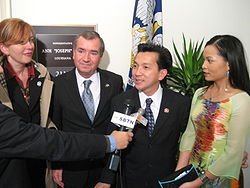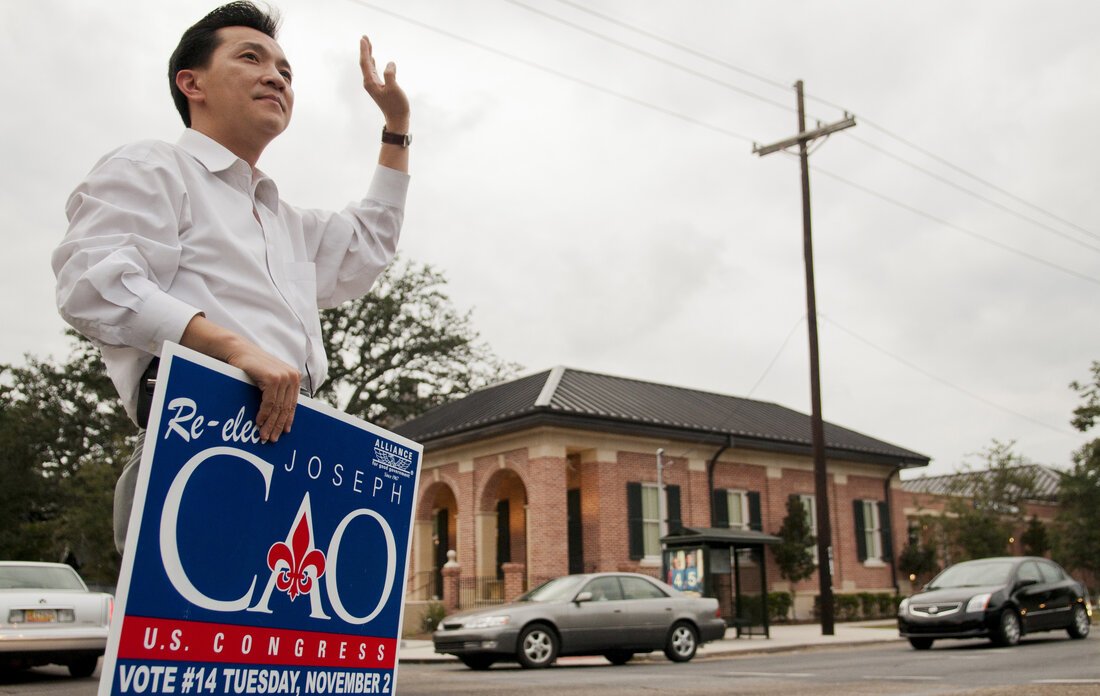Congressman Anh “Joseph” Cao
Former Congressman Joseph Cao, a resident of New Orleans East, played a crucial role in the area's restoration after Hurricane Katrina. Prior to his entrance into politics, Congressman Cao trained to be a priest with the Society of Jesus. After realizing that the seminary was not his calling, he switched his focus toward earning a law degree and eventually running for public office. We were unable to include photos of the Congressman and his family prior to 2005 as they were destroyed in Hurricane Katrina.
Congressman Cao has two daughters and one son at the age of five. One of his daughters is in her final year of college at the University of Texas Austin, the other is in her third year of college at Louisiana State University.



Where did you end up immediately following the evacuation [of Vietnam]?
After we were airlifted by the US military, in April of 1975, we first landed in the Philippines. I believe it was only for a few hours to change planes, and then they flew us over to Guam where I spent around three weeks. After Guam, they then resettled us to the refugee camp in Fort Chaffee Arkansas, where I lived for about six/seven months waiting for a sponsor. Then, we were sponsored by a couple in Goshen, Indiana.
I read online that your father served in the South Vietnamese army where he was captured by the North Vietnamese army and spent years in reeducation camp. Did that experience shape your sense of duty?
My father’s experience in the reeducation camps did not influence my decision to go into public life. It was my time in the Society of Jesus. However, my father’s experience in the reeducation camp did influence how I view the Vietnamese government and the policies that I would try to implement against the communist government. My interest in promoting religious freedom in Vietnam and democratic rights to push Vietnam to be a freer country when I was in Congress was somewhat influenced by my father’s own experience being a prisoner of war.
Have you noticed a change in how younger generations connect with their heritage when they don’t speak Vietnamese fluently?
Yes, that has always been a challenge within the Vietnamese community here in the United States. Being born here, I believe that their mindset is more American than Vietnamese. But because they grew up here in New Orleans East and attended catechism events there they do know certain aspects of Vietnamese culture and we try our best to instill certain aspects of the Vietnamese culture into our children like respecting the elderly, trying to help other people, being community and family oriented.
Timeline
1975 - Arrival in the US
Joseph Cao was 8 years old. “After we were airlifted by the US military, in April of 1975 we first landed in the Philippines, I believe it was only for a few hours to change planes, and they flew us over to Guam where I spent around 3 weeks. After Guam, they then resettled us to the refugee camp in Fort Chaffee Arkansas, where I lived for about 6-7 months waiting for a sponsor. Then we were sponsored by a couple in Goshen, Indiana.”
He lived in Goshen Indiana from 1975-1979.
1980-1986
Cao and his family moved and lived in Houston, Texas for 6 years.
1990 to 1996 - The Society of Jesus
Cao spent time with the Society of Jesus training to be a Catholic priest. During his time there he was sent all over the U.S. and other parts of the world assisting Vietnamese refugees. He knew he was interested in promoting social justice and knew he had to leave the society to do it more efficiently.
1997 - Move to New Orleans East
Cao originally decided to come to New Orleans for law school. He hoped to eventually get involved in politics and knew of a large Vietnamese community in New Orleans East.
2005 to 2007 - Help with Hurricane Katrina Relief
Joseph Cao saw the struggles of his community, as well as his own, of rebuilding houses, livelihoods, and his own law practice in the Westbank.
“But just living in New Orleans at the time I realized the frustrations that we had as well as the overall city had in regards to how money was not being pushed out through FEMA to help rebuild the city.”
2008 - Elected as a U.S Representative
Congressman Joseph Cao was the first Vietnamese-American politician who was the U.S. representative for Louisiana’s 2nd congressional district from 2009-2011.
March 13, 1967
Joseph Cao was born in
Ho Chi Minh City, Vietnam
1979-1980
Cao and his family moved to Mississippi.
“Being the first Vietnamese American in Congress, that was a historical moment. People would assume that the first Vietnamese American congressman would come out of California. But, low and behold, he came out of a little community in Louisiana which caught everybody by surprise.”
What experiences shaped your desire to be involved in the community in New Orleans East or your desire to be a politician?
What sparked my interest to become a politician was joining the Jesuits after college. The Jesuits are known for their interest in education as well as missionary work. I was sent to many other parts of the world; I worked with refugees in Hong Kong and various parts of the US. I was very much interested in promoting social justice. That was when I started thinking about how to do it in a more efficient manner. I figured that I needed to implement laws around that. That started my interest in becoming a politician and eventually going to law school.
What are the experiences that made you want to be a congressman
When I was a United States Representative in this area, I had a duty to represent my constituents and their interests. And, of course, being an Asian Republican representing a Black Democratic district was quite a difficult task. Oftentimes, the perceived interest of my constituents conflicts with my own interest, but of course, I had to make decisions that would be in their best interests. That is why when it comes to issues like healthcare, I was the only Republican to vote for the House version of the Affordable Care Act. But, I eventually voted against the final passage of the healthcare bill because it did not have a provision that would prevent federal funding from going into abortion services. Essentially, as a representative of a Black district, a Democratic district, I tried to vote according to the needs of my constituency as long as it did not conflict with my own morality.
As the first Vietnamese-American to serve in Congress, did you feel a sense of responsibility to represent both the broader Asian Americans in the US and your district’s unique needs?
I do feel the need to represent the Vietnamese community especially when it comes to advocating religious freedom, and human rights, and trying to help the various communities here in the US who are dealing with their own social justice issues. For example, the Vietnamese community in Atlanta I believe was dealing with the same issue as the Vietnamese community here after Katrina where they wanted to build a landfill probably less than half a mile from the church there. They invited me down and we helped organize the opposition and succeeded. I try to travel all over the United States to see what their needs are. But, my priority was obviously down here in New Orleans.


